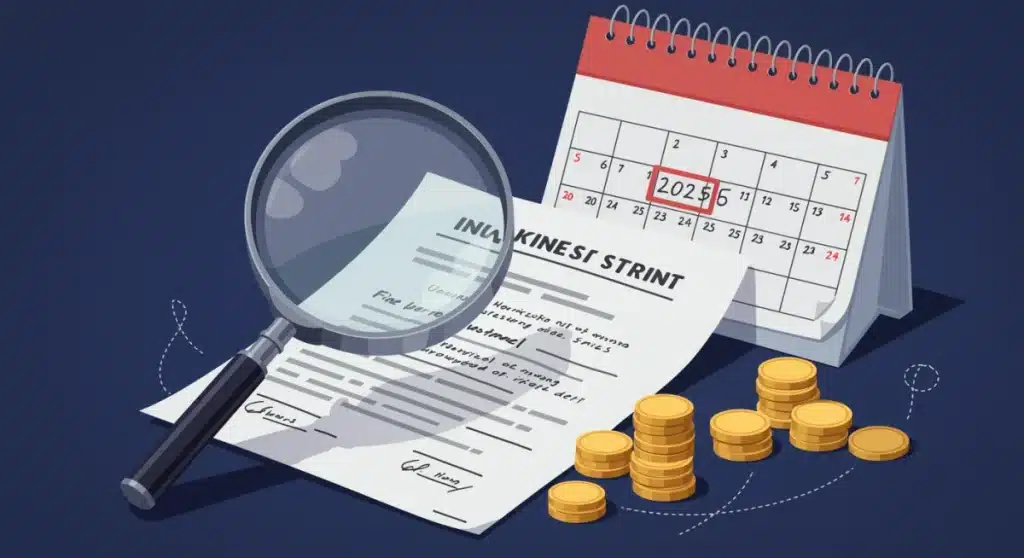Avoiding Hidden Real Estate Fees: Consumer’s 2025 Guide

Latest developments on Avoiding Hidden Fees: A Consumer’s Guide to Transparent Real Estate Costs in 2025 reveal crucial strategies for buyers and sellers in the United States to navigate an evolving market with greater financial clarity and protection.
As the real estate landscape continues to shift, understanding and effectively avoiding hidden real estate fees is paramount for consumers in 2025. This guide cuts through the complexity, offering timely, factual information on what to expect, how to identify opaque charges, and proactive steps to ensure transparent transactions in the current market.
Understanding the Evolving Real Estate Fee Landscape in 2025
The real estate market in 2025 is marked by increased scrutiny on transaction costs, driven by consumer advocacy and regulatory adjustments. Buyers and sellers alike face a complex array of potential charges, some standard and others less obvious. Staying informed is the first line of defense against unexpected financial burdens that can significantly impact a real estate deal.
Recent shifts in market practices and legal frameworks aim to foster greater transparency, but vigilance remains key. Consumers must be proactive in questioning every line item and understanding its purpose. This proactive approach is essential for avoiding hidden real estate fees and ensuring a fair transaction.
New regulations and their impact
Several states and federal agencies have introduced or are considering new regulations designed to protect consumers from undisclosed charges. These initiatives often focus on requiring clearer disclosure forms and standardizing certain fee structures. For instance, the National Association of Realtors (NAR) settlement, while primarily addressing commission structures, has ripple effects that emphasize transparency across all transaction costs. This means agents are now more explicitly detailing their compensation, which can help shed light on other associated fees.
- Enhanced disclosure forms: Expect more detailed breakdowns of costs, making it harder for fees to be buried in general categories.
- Standardized terminology: Efforts are underway to standardize the language used for various fees, reducing ambiguity.
- Increased agent accountability: Agents are increasingly responsible for ensuring clients understand all costs involved, not just their commission.
These regulatory shifts are positive steps, but they do not eliminate the need for individual due diligence. Consumers should still treat every proposed fee with an investigative mindset, asking for clarification and justification.
Identifying Common Real Estate Fees Beyond the Purchase Price
Beyond the advertised purchase price, numerous fees can accumulate, often surprising unprepared buyers and sellers. These are not always ‘hidden’ in a deceptive sense but can be overlooked if not explicitly discussed and understood. Knowing what to look for is crucial for avoiding hidden real estate fees and budgeting accurately.
From closing costs to appraisal fees, each step of a real estate transaction incurs its own set of charges. Being aware of these typical expenses allows for better financial planning and negotiation. It also empowers consumers to challenge charges that seem unusual or excessive.
Buyer-side fees to scrutinize
Buyers typically encounter a range of fees associated with securing a mortgage and transferring property ownership. These include:
- Loan origination fees: Charges by the lender for processing your loan, often a percentage of the loan amount.
- Appraisal fees: Cost for a professional appraisal to determine the property’s market value.
- Title insurance: Protects both the lender and buyer against title defects.
- Escrow fees: Paid to the escrow company for managing the transaction’s funds and documents.
- Recording fees: Charged by local government for recording the sale.
- Prepaid property taxes and homeowner’s insurance: Often required to be paid upfront for a certain period.
It’s vital for buyers to receive a Loan Estimate within three business days of applying for a mortgage and a Closing Disclosure at least three business days before closing. These documents provide a detailed breakdown of all costs, making it easier for avoiding hidden real estate fees by comparing initial estimates with final figures.

Seller-Side Expenses and How to Mitigate Them
Sellers also face a multitude of costs that can erode their profits if not anticipated. While some fees are standard, others can be negotiated or even avoided with careful planning. Understanding these expenses is key to maximizing your return on investment and successfully avoiding hidden real estate fees.
From agent commissions to transfer taxes, these costs can add up quickly. A savvy seller will engage in thorough research and negotiation to keep these expenditures in check. Being prepared for these costs can prevent last-minute surprises and financial strain.
Key seller costs to anticipate
Sellers typically incur expenses related to preparing the home for sale, marketing, and the actual transfer of ownership. These commonly include:
- Real estate agent commissions: Historically a significant portion, though recent changes may impact how these are structured and paid.
- Transfer taxes: State or local taxes on the transfer of property ownership.
- Escrow fees: Similar to buyers, sellers often pay a portion of escrow costs.
- Title insurance (owner’s policy): In some regions, sellers pay for the buyer’s title insurance.
- Attorney fees: If legal counsel is used for contract review or closing.
- Home staging and repairs: Costs to prepare the home for market, though not strictly transaction fees, they impact net proceeds.
Sellers should actively discuss all potential costs with their real estate agent and legal counsel. Requesting an estimated seller’s net sheet early in the process can provide a clear picture of expected expenses and net proceeds, aiding in avoiding hidden real estate fees by identifying any unusual or unexpected charges upfront.
The Role of Technology and Online Platforms in Fee Transparency
In 2025, technology plays an increasingly significant role in demystifying real estate costs. Online platforms, digital tools, and data analytics offer consumers unprecedented access to information, helping them to compare services, understand pricing, and ultimately navigate transactions with greater transparency. This technological integration is a powerful ally in avoiding hidden real estate fees.
From AI-powered fee calculators to blockchain-based smart contracts, these innovations are streamlining processes and reducing opportunities for opaque charges. Leveraging these tools can provide a significant advantage for both buyers and sellers.
Leveraging digital tools for cost analysis
Several digital resources are now available to help consumers estimate and track real estate costs:
- Online closing cost calculators: These tools provide estimates of various fees based on location, property value, and loan amount.
- Real estate market data platforms: Offering insights into average commission rates and other localized fees, empowering negotiation.
- Digital closing platforms: Streamlining the closing process, these platforms often provide clear itemized lists of all charges before closing.
Consumers should utilize these digital resources to cross-reference information provided by their agents and lenders. Any discrepancies or unexplained charges found through these tools should prompt further investigation. Technology is a critical component in the modern consumer’s toolkit for avoiding hidden real estate fees.
Negotiation Strategies for Reducing Real Estate Expenses
Many real estate fees are negotiable, contrary to popular belief. Understanding which fees are flexible and how to effectively negotiate them can lead to substantial savings. A proactive and informed approach to negotiation is a cornerstone of avoiding hidden real estate fees.
Whether it’s agent commissions, lender fees, or even certain closing costs, there’s often room to maneuver. Successful negotiation requires research, clear communication, and a willingness to walk away if terms are unfavorable. This assertive stance can save thousands of dollars.
Tactics for effective fee negotiation
Engaging in strategic negotiation can significantly reduce your overall real estate costs:
- Negotiate agent commissions: While not always easy, particularly in competitive markets, commission rates can be negotiated, especially if you are both buying and selling with the same agent.
- Shop for lenders: Different lenders offer varying loan origination fees, interest rates, and other associated costs. Comparing multiple offers can yield better terms.
- Review and challenge junk fees: Be skeptical of vague fees like ‘administrative fees’ or ‘processing fees.’ Ask for detailed explanations and justification.
- Ask the seller to cover certain costs: In a buyer’s market, or if the home has issues, buyers can sometimes negotiate for the seller to pay some closing costs.
- Consider a flat-fee or discount broker: For sellers comfortable with more DIY involvement, these options can significantly reduce commission costs.
Remember, every dollar saved on fees is a dollar that stays in your pocket. Do not hesitate to question charges and explore alternatives. Effective negotiation is a powerful tool for avoiding hidden real estate fees and ensuring a financially sound transaction.

Legal Protections and What to Do If You Suspect Undisclosed Fees
Consumers in the United States are afforded several legal protections designed to ensure transparency in real estate transactions. Understanding these rights and knowing how to act if you suspect undisclosed or unfair fees is critical. These legal safeguards are vital tools for avoiding hidden real estate fees and seeking recourse when necessary.
From federal laws requiring specific disclosures to state-level consumer protection acts, a framework exists to prevent exploitation. Being aware of these protections empowers consumers to challenge questionable practices and protect their financial interests.
Key consumer protection laws
Several laws provide a safety net for real estate consumers:
- Real Estate Settlement Procedures Act (RESPA): A federal law that requires lenders to provide borrowers with disclosures regarding the nature and costs of the real estate settlement process. It prohibits certain practices, like kickbacks.
- Truth in Lending Act (TILA): Requires lenders to disclose the full cost of credit, including the annual percentage rate (APR) and other loan terms.
- State-specific consumer protection laws: Many states have their own regulations that offer additional protections against deceptive trade practices in real estate.
If you suspect you are being charged an undisclosed or unfair fee, the first step is to request a detailed explanation in writing. If the explanation is unsatisfactory, consider consulting with a real estate attorney or filing a complaint with your state’s real estate commission or the Consumer Financial Protection Bureau (CFPB). These actions are crucial for holding parties accountable and effectively avoiding hidden real estate fees.
Proactive Measures for a Transparent Real Estate Transaction
The best defense against hidden fees is a strong offense. Adopting proactive measures throughout the real estate process can significantly enhance transparency and protect your financial interests. This forward-thinking approach is fundamental to successfully avoiding hidden real estate fees in 2025 and beyond.
From initial research to the final closing, every step offers an opportunity to ensure clarity. Being well-prepared and diligent will save you time, money, and stress in the long run.
Essential steps for consumers
To ensure a transparent transaction, consider these proactive steps:
- Educate yourself: Understand the typical costs associated with buying or selling in your specific market.
- Choose reputable professionals: Work with experienced and trustworthy real estate agents, lenders, and attorneys who prioritize transparency.
- Read all documents carefully: Never sign anything you don’t fully understand. Ask questions and seek clarification.
- Get everything in writing: All agreements, estimates, and disclosures should be documented.
- Compare estimates: Obtain quotes from multiple service providers (e.g., lenders, title companies) to compare costs.
By implementing these proactive strategies, consumers can significantly reduce their exposure to unexpected charges and confidently navigate the complexities of the real estate market. This diligence is the ultimate pathway to avoiding hidden real estate fees and achieving a successful outcome.
Key Point |
Brief Description |
|---|---|
Regulatory Shifts |
New rules in 2025 emphasize disclosure and standardization to protect consumers. |
Common Fees |
Identify typical buyer and seller costs like loan origination, appraisal, and commissions. |
Negotiation Power |
Many fees are negotiable; compare offers and challenge vague charges for savings. |
Proactive Measures |
Educate yourself, read documents carefully, and utilize digital tools for transparency. |
Frequently Asked Questions About Real Estate Fees
▼
Common hidden fees often include administrative charges, courier fees,
document preparation fees, and sometimes inflated appraisal or title
search costs. These are often small individually but can accumulate significantly,
impacting the final cost if not scrutinized.
▼
Look for vague descriptions, duplicate charges, or fees not previously
discussed. Compare your Loan Estimate with the Closing Disclosure for
any significant discrepancies. Always ask for a detailed explanation and
written justification for every line item you don’t understand.
▼
Yes, agent commissions remain negotiable. While traditional rates exist,
market conditions and the level of service required can influence the final
percentage. Recent industry changes also encourage more direct negotiation
between buyers and their agents regarding compensation.
▼
Real estate attorneys can review contracts and disclosures to identify
potentially unfair or hidden charges. They ensure all terms comply with
local and federal laws, offering an essential layer of protection and
guidance throughout the complex transaction process.
▼
If you believe you’ve been unfairly charged, gather all documentation and
first attempt to resolve it directly with the party involved. If unsuccessful,
consider filing a complaint with your state’s real estate commission,
the CFPB, or consulting a real estate attorney for legal recourse options.
What This Means for Consumers
The landscape of real estate fees in 2025 demands an informed and proactive consumer. Successfully avoiding hidden real estate fees hinges on diligent research, strategic negotiation, and leveraging available legal protections. As the market continues to evolve, staying updated on regulatory changes and employing these strategies will be crucial for securing transparent and financially sound real estate transactions.





